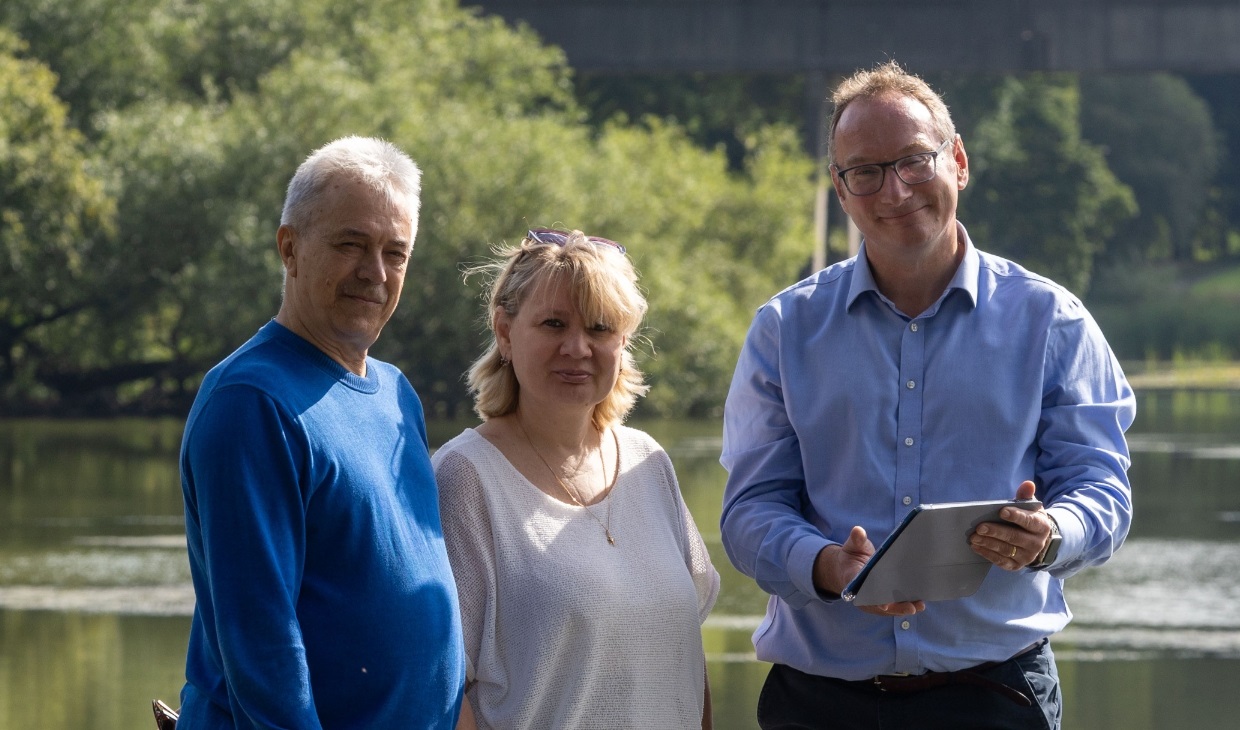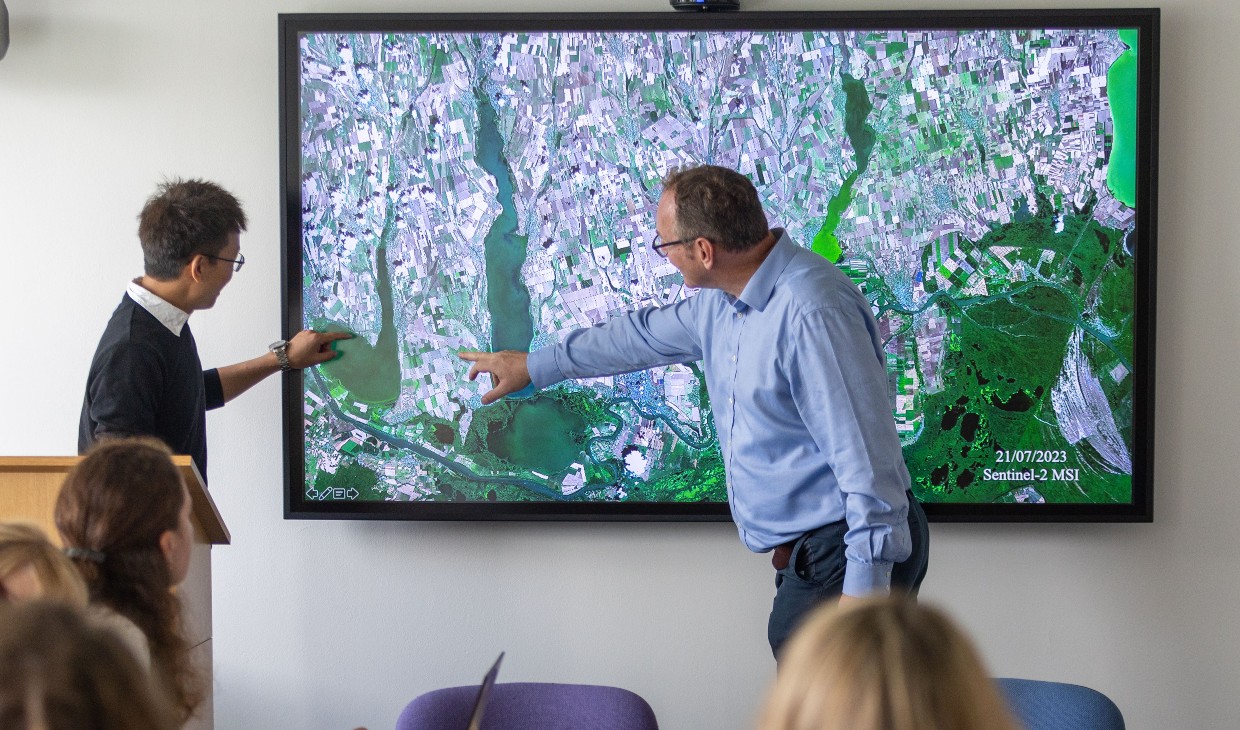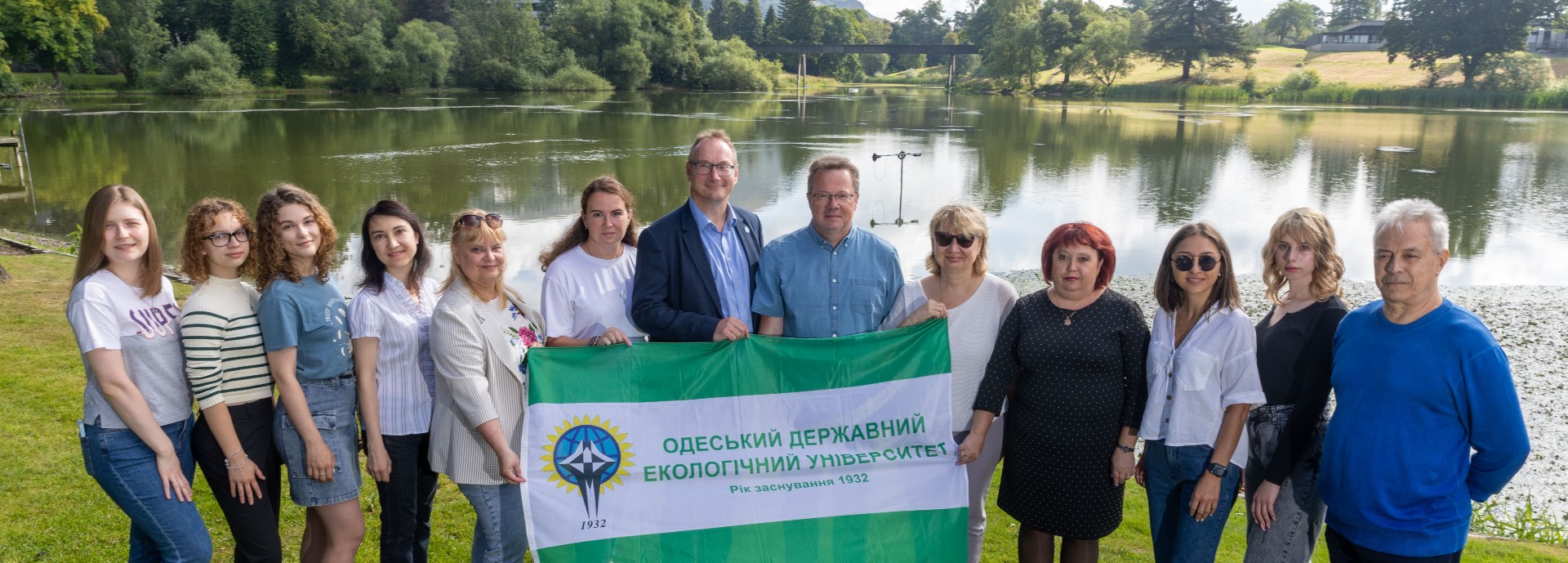Ukrainian academics have visited the University of Stirling as part of a joint research project aimed at improving water quality in the war-torn country.
Ongoing Russian attacks are destroying vital infrastructure, including the Kakhovka Dam and hydroelectric power plant, and damaging water pumping stations, purification plants and wastewater treatment facilities, causing contamination of ground and surface waters, according to the United Nations Environment Programme.
A delegation from Odesa State Environmental University came to Scotland to work with experts at the University of Stirling who have pioneered technology which can remotely monitor water quality using satellites. During the two-week visit the group carried out experiments in the University laboratories and at Loch Lomond.
Ukrainian academics draw on University of Stirling’s water quality expertise
Professor of Environmental Science and Scotland Hydro Nation Chair, Andrew Tyler, who is the University of Stirling’s lead for the joint research project, said: “Water quality is crucial to human health but the war in Ukraine has impacted the quality of water in rivers, lakes and reservoirs, and in the coastal environment.
“Conventional sampling of aquatic systems is challenging during military conflicts so it is vital that observations can be carried out remotely.
“We can do this using new satellite products, which provide free-to-access, consistent and long-term Earth Observation (EO) data.
“We were keen to share our expertise with academics from Odesa State Environmental University so that they can fully exploit the potential for national monitoring.”

(l-r) Professor Nikolai Berlinsky, Professor Valeriya Ovcharuk, Professor Andrew Tyler
Russia has intensified its bombardment of Odesa since Moscow pulled out of a UN grain deal in July. The attacks have hit residential buildings, shopping centres and cars, killing and injuring civilians.
Professor Nikolai Berlinsky, Head of the Oceanology and Marine Management Department at Odesa State Environmental University, who was part of the delegation that visited Stirling, said: “Work at sea is prohibited so there is no way to fully carry out scientific marine expeditionary work. It is impossible to assess the current state of the marine environment and its habitat.
“The destruction of the Kakhovka hydroelectric power station may affect a change in hydrodynamic and environmental conditions in the area of the Dnieper mouth and marine coastal zone, so monitoring is absolutely necessary.
“The war has also disabled or destroyed a lot of specialised equipment, and the status of water bodies close to areas of intense fighting has deteriorated. Restoring observation infrastructure can take a long time.
“Water quality data obtained from EO will provide a robust approach to national monitoring and offer continuity. This will contribute to the improvement of the monitoring system for water quality and the proactive adoption of emergency measures in case of their significant deterioration.”

Professor Andrew Tyler delivering a lecture to the Ukrainian delegation
Dr Valeriy Khokhlov, Professor at Odesa State Environmental University and visiting researcher at the University of Stirling, said: “During the visit, staff and students received hands-on experience in the use of a variety of bio-optics and radiometry sensors in the field.
“Participants were also trained in analysis of water samples at University of Stirling laboratories, and we introduced EO techniques using free-to-access data from operational satellite missions and open-source software libraries.”
Unique practical training
Doctor of Geography, Professor Valeriya Ovcharuk, who is Director of the Hydrometeorological Institute and Head of the Land Hydrology Department at Odesa State Environmental University, led the delegation.
She said: “We benefited from very interesting and useful experience with modern equipment and satellite data, which can be used both for educational purposes and for scientific research on water quality in the Danube lakes, which are practically the only sources of water supply in small settlements in the south of Ukraine, in conditions of increasing aridity with climate change.
“Students received unique practical training, which is currently not possible in Ukraine due to the limited access to water bodies due to military operations. The teaching staff improved their qualifications and expanded their knowledge of the possibilities of using satellite data in hydro-ecological research, which will subsequently be used in lecture courses and practical exercises.
“The opportunity to visit Scotland, to get acquainted with its beautiful nature and culture, and of course communicate with the hospitable hosts from the University of Stirling, serves as an incentive to continue our work, despite all the difficulties of wartime. We hope to continue of our fruitful cooperation.”
Post-war reconstruction
The University of Stirling has been awarded funds through Universities UK International’s (UUKi) twinning initiative to support the joint research project.
A total of £4.42 million made available to universities across the UK will help fortify research capacity in Ukraine’s universities, preventing a brain drain of academic talent and ensuring the country’s universities can play a critical role in post-war reconstruction.
More information about the twinning grants scheme can be found here.

